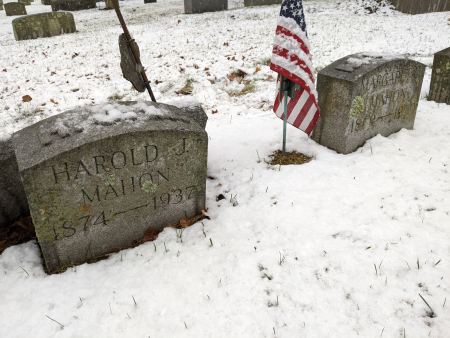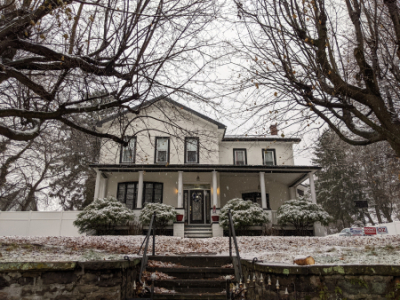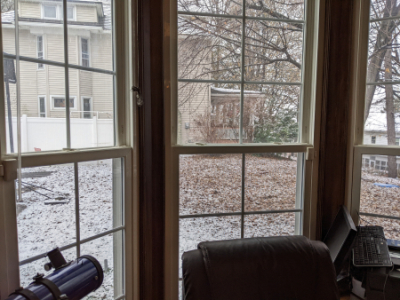We’ve been eagerly waiting for the new season of the Institute for Justice’s podcast series, “Bound by Oath” to drop. Not only because it’s a great series – produced by John Ross, it is more like an audio documentary than a typical podcast – but also because John was kind enough to ask us to participate again (our last appearance was in Season 1, where we guested on the episode about the origins of the “incorporation” doctrine).
This season is all about property rights, and episode 2 is all about regulatory takings. Pennsylvania Coal Co. v. Mahon, and Penn Central Transp. Co. v. New York City, to be exact.
So just over a year ago, John and I headed up to anthracite coal country in Pennsylvania. We wanted to be on site on the exact 100th anniversary of the Supreme Court issuing the Mahon decision. Why? It just seemed appropriate. And as true takings nerds, we couldn’t resist the chance to be in the room where it happened. Kind of a “John and Robert’s Excellent (Takings) Adventure.”
And as you dirt lawyers know, nothing substitutes for a site visit.
In addition to John, me, and two Pittston lawyers who now own and used to own the former Mahon property, also weighing in is Professor William Fischel, who shares the insights about the Mahon case he learned while researching his book “Regulatory Takings” (1995)
And not content to cover the case that is seen as the first modern regulatory takings decision (the case is often wrongly assumed to be where the regulatory takings doctrine got its start), this episode also gives an in-depth treatment to the other well-known takings case with “Penn” in its name: Penn Central.
For that one, John goes to the source, Professor Gideon Kanner in what might be his final interview. Professor Kanner, of course, authored the seminal law journal article about the case, so he was a natural for this part of the episode. See Kanner, Making Laws and Sausages: A Quarter-Century Retrospective of Penn Central Transportation Co. v. City of New York, 13 Wm. & Mary Bill of Rts. J. 679 (2005). Don’t miss out on this part of the episode, or you will miss some of the classic “Kannerisms” the good Professor issues.
Professor Kanner is also responsible for the episode’s title, from his reaction to the three factors the Court seemingly created from whole cloth in Penn Central:
John: The Court said, there would be quote “no settled formula” for determining when a taking requiring just compensation had occurred. But there are three factors to consider. It didn’t say how much weight courts are supposed to give each factor or what evidence litigants could use to satisfy them.
Gideon Kanner: So it was another one of these impossible-to-meet criteria. There were three factors. There’s no rule, but three factors, such as the impact on the owner, the nature of the government activity. So we all looked at each other: What the hell does that mean? All it did was confuse the law. The Court was groping in a fog.
This is a not-to-be-missed episode.
Here’s the description from IJ:
In 1922, Scranton, Pennsylvania was said to be on the verge of collapsing into the vast coal mines beneath the city; residents, buildings, and streets alike were being swallowed up by “suddenly yawning chasms.” State legislators responded by unanimously passing a law meant to save the region, where about a million people lived, from total desolation. But when the law reached the Supreme Court, the justices struck it down, ruling that it would be an unconstitutional “regulatory taking” to force coal companies to leave their coal in the ground. On this episode, we go to nearby Pittston, Pennsylvania to find out what happened to the house at the center of the case. Did it—or Scranton—fall into the pits? After that, we trace the major developments in regulatory takings doctrine, which protect against regulations that go “too far.” But we wind up in a bit of a fog. Plus! This episode will have an unsolved murder—and some Supreme Court trivia: did you know a future Supreme Court justice argued the case on behalf of Scranton (at least in state court)?
Click here for transcript.
In case you are aching for some visuals to go with your listening, here you go.

We paid our respects to Mr. and Mrs. Mahon.
The episode also has a murder mystery,
something you don’t see everyday in takings cases.
Check the episode out here, and be sure to subscribe so you don’t miss future eps.
Pennsylvania Coal Co. v. Mahon, 260 U.S. 393 (Dec. 11, 1922)



